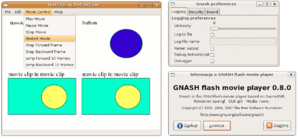Gnash (software)
 |
|

|
|
| Developer(s) | Rob Savoye, Sandro Santilli, Bastiaan Jacques, Benjamin Wolsey, Zou Lunkai, Tomas Groth, Udo Giacomozzi, Hannes Mayr, John Gilmore, Markus Gothe. |
|---|---|
| Stable release |
0.8.10 / February 15, 2012
|
| Repository | http://git.savannah.gnu.org/cgit/gnash.git, git://git.savannah.gnu.org/gnash.git |
| Written in | C++, GTK+ / Qt |
| Operating system | BSD, Linux and Microsoft Windows |
| Type | Media player |
| License | GNU General Public License |
| Website | gnu |
Gnash is a media player for playing SWF files. Gnash is available both as a standalone player for desktop computers and embedded devices, as well as a plugin for several browsers. It is part of the GNU Project and is a free and open-source alternative to Adobe Flash Player. It was developed from the gameswf project.
Gnash was first announced in late 2005 by software developer John Gilmore. As of 2011[update], the project's maintainer is Rob Savoye. The main developer's web site for Gnash is located on the Free Software Foundation's GNU Savannah project support server.
Gnash supports most SWF v7 features and some SWF v8 and v9, however SWF v10 is not supported.
Writing a free software Flash player has been a priority of the GNU Project for some time. Prior to the launch of Gnash, the GNU Project had asked for people to assist the GPLFlash project. The majority of the previous GPLFlash developers have now moved to the Gnash project and the existing GPLFlash codebase will be refocused towards supporting embedded systems.
The primary distribution terms for Gnash are those of the GNU GPL. However, since Gnash was started using the codebase of the gameswf project, which is in the public domain, code developed by the Gnash project which might be useful in gameswf is placed in the public domain.
Adobe only provides an outdated version (11.2) of its official player for Linux on IA-32 and an AMD64 developer preview release in a binary-only form. Gnash, however, can be compiled and executed on many architectures, including x86, ARM, MIPS, and PowerPC. It also supports BSD-based operating systems. An early port for RISC OS, which has never had Macromedia/Adobe Flash support beyond Flash 3, does exist, as well as an early port for BeOS, where Flash support terminated at Version 4. Development of a port to AmigaOS 4.1 has also recently begun. A port to the Haiku Operating System also exists.
...
Wikipedia
